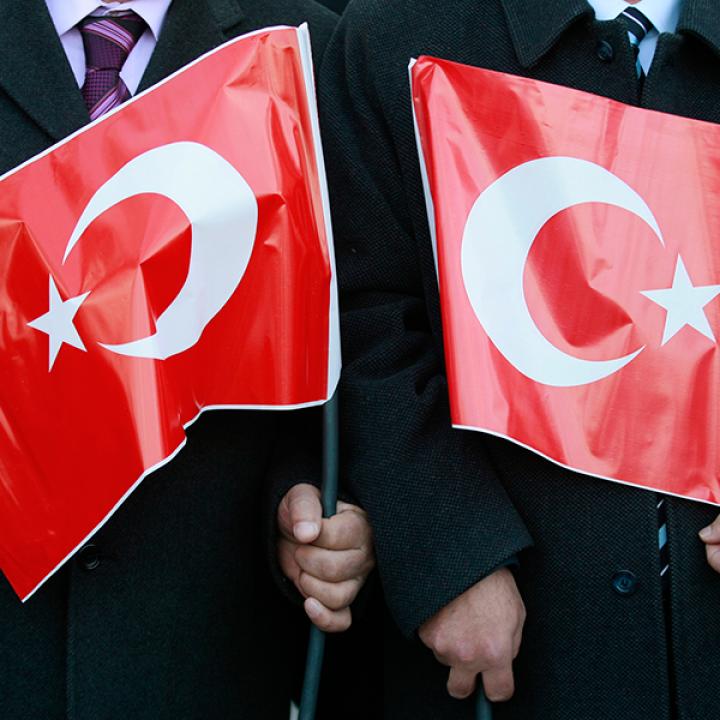

According to President Erdogan's worldview, the 40 million Turkish citizens who oppose him stand for alien and imported interests, signaling much discord ahead.
The failed 2016 coup has remolded Turkey in irreversible fashion. Turkish President Recep Tayyip Erdogan, hitherto loved by his followers and having barely survived an attempt on his life, emerged from the abortive putsch as the embodiment of the "people's will" in the eyes of his base.
As I explain in my book The New Sultan, Turkey's brand of political Islam in Turkey, championed by Erdogan, is first and foremost a nativist movement, which sees only its supporters as the true people of the land. Erdogan, who came to power through his Justice and Development Party (AKP) in 2002, is a prototype for nativist leaders globally. Erdogan's political antecedents are rooted in National Outlook, an essentialist Turkish political movement that he joined in the 1970s as a young adult.
The conflicts that unfolded in Turkey during the 1970s were not between secularism and Islam. Rather, during this period, the Cold War contest between left and right provided the symbols and labels for political unrest, resulting in violent civil war-like fighting in the streets.
Erdogan and his conservative friends watched as the Marxist left and the nationalist right battled each other over their conflicting ideological visions. Little excited him in this contest. The Marxist jargon of the leftist students was foreign and obscure. The ultranationalists claimed to stand for patriotic values and traditional morality, though they also subscribed to Turkish racial superiority. The latter stance alienated the National Outlook movement, which regarded all Muslims as equal brothers, from the nationalists.
In the 1970s, among Erdogan's social circle and across Muslim-majority countries, a unique political message was gaining traction. Erdogan's sensibilities closely aligned with this new ideology: political Islam. Theorists like Sayyid Qutb in Egypt and Ali Shariati in Iran argued that the "Muslim world" had taken a disastrous turn when it embraced secular ideologies, whether nationalism or Marxism, as the answers to society's problems.
The political Islamists believed that such ideologies had nothing to offer Muslim nations except more of the same: poverty and repression, coupled with cultural and political humiliation by the West. Returning to Islam, or rather, the version of Islam that this new movement's leaders propounded, was the only way to lift the masses out of their misery.
Therefore, Turkey's transformation would not be premised on a foreign ideology. The country's salvation had to derive from the stock of traditions and ideas that had made the Turks great in past centuries—for conservatives, this meant understanding the necessity of Islamic guidance to politics. This native political movement would embody the essence of the Turkish nation against its opponents; only such a movement could succeed in making Turkey great again.
Dubbed National Outlook, this brand of political Islamism, which matured in the 1970s, never grew tired of defining the world in terms of religious enmities. Unfortunately, despite the AKP's pro-business approach, these same timeworn themes have worked their way into Erdogan's rhetoric. This prejudice has resurfaced in recent years; a case in point was Erdogan's dark suggestion in 2012 of the existence of an "interest-rate lobby"—poorly veiled code for the Jewish community—that is conspiring to keep Turkey financially unstable for the "lobby's own benefit." Comprehending Erdogan requires understanding the pervasive intellectual influence imprinted on him by his antecedents in the National Outlook movement.
Erdogan and other AKP cadres view only those that embrace political Islam as representing the people's will, as well as being the true inheritors of Turkey. According to this Weltanschauung, the AKP's detractors, nearly half the country, constituting around 40 million people, stand for alien and imported foreign interests. For them, the opposition groups are "proxies" for outside actors conspiring to undermine Erdogan's agenda of making Turkey great again.
Soner Cagaptay, the Beyer Family Fellow and director of the Turkish Research Program at The Washington Institute, is the author of The New Sultan: Erdogan and the Crisis of Modern Turkey.
Insight Turkey



